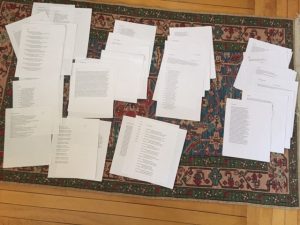 I’ve been gathering and arranging poems to see if they make up a book, yet. A whole nother level of attention. Some have been published, of course, but some I’m pulling up out of the dark of my computer files and examining with squinty eyes. I'm editing a lot. I don’t know. I feel as always, miserably insecure. But it’s useful to see what’s here. I may be writing the same poem over and over. Always there’s the agony, the despair. How many ways can that be held up to the light?I’m particularly alert to what others are writing. I just read a poem that ends, “Soothe me, soothe me, baby.” Can we be soothed, right now? But then I remember my first husband’s grandmother getting pessimistic before she died, saying how horrible everything was, how the world was coming to an end. It made me mad. I thought, “Your life is almost over, so you want to end everything, then? How narcissistic! Let the rest of us have our lives, our happiness.”
I’ve been gathering and arranging poems to see if they make up a book, yet. A whole nother level of attention. Some have been published, of course, but some I’m pulling up out of the dark of my computer files and examining with squinty eyes. I'm editing a lot. I don’t know. I feel as always, miserably insecure. But it’s useful to see what’s here. I may be writing the same poem over and over. Always there’s the agony, the despair. How many ways can that be held up to the light?I’m particularly alert to what others are writing. I just read a poem that ends, “Soothe me, soothe me, baby.” Can we be soothed, right now? But then I remember my first husband’s grandmother getting pessimistic before she died, saying how horrible everything was, how the world was coming to an end. It made me mad. I thought, “Your life is almost over, so you want to end everything, then? How narcissistic! Let the rest of us have our lives, our happiness.”  I watch our grandchildren, playing field hockey, running, singing, acting, making music of all sorts, studying for the LSATS, and so on, all enthusiastic, excited about what’s to come. Also I know there’s an epidemic of anxiety among young people. Some of our grandchildren have a lot of it. When I was young, I had a lot of anxiety. Anxiety comes with living. But there’s the almost unbearable weight of it now, the literal dying of our world, the short time we have to remedy it.Of course everything dies. Poems turn to dust, the earth will burn up, and so on. Consciousness is all. I would liken our role now as sitting at your mother’s bedside. She’s dangerously ill. You do what you can. You bring water, you get the multitude of details from the doctor, you read about the illness on line, but the most courageous thing you have to do is not sink. Not sink into despair, not pull away out of despair, and not make up artificially optimistic stories out of despair. You bring water, you smooth her forehead, you re-tell stories from the past. Sometimes you sing. Is your heart breaking? Not yet. You don’t know the outcome. Doctors don’t know, yet. They say, “time will tell.” They’re using their best medicine. You’re secretly adding herbs and prayers.Some poem titles, not mine, but indicative of what I mean: “Sentience as an Outing to the Zoo.” “I Never Used to Write about Birds,” “The Lights in the Sky Are Stars.” I see each one of these veering off from despair yet holding onto the thread of reality.I have been trying all morning to write a poem about the Victorian filigree on our cottage windows. I keep erasing because the poem keeps moving into despair and loss: a cliché, a knee-jerk reaction. What am I after? I don’t know. Something about the filigree attracts me. It’s uselessness. I am so tenderly attracted to uselessness.
I watch our grandchildren, playing field hockey, running, singing, acting, making music of all sorts, studying for the LSATS, and so on, all enthusiastic, excited about what’s to come. Also I know there’s an epidemic of anxiety among young people. Some of our grandchildren have a lot of it. When I was young, I had a lot of anxiety. Anxiety comes with living. But there’s the almost unbearable weight of it now, the literal dying of our world, the short time we have to remedy it.Of course everything dies. Poems turn to dust, the earth will burn up, and so on. Consciousness is all. I would liken our role now as sitting at your mother’s bedside. She’s dangerously ill. You do what you can. You bring water, you get the multitude of details from the doctor, you read about the illness on line, but the most courageous thing you have to do is not sink. Not sink into despair, not pull away out of despair, and not make up artificially optimistic stories out of despair. You bring water, you smooth her forehead, you re-tell stories from the past. Sometimes you sing. Is your heart breaking? Not yet. You don’t know the outcome. Doctors don’t know, yet. They say, “time will tell.” They’re using their best medicine. You’re secretly adding herbs and prayers.Some poem titles, not mine, but indicative of what I mean: “Sentience as an Outing to the Zoo.” “I Never Used to Write about Birds,” “The Lights in the Sky Are Stars.” I see each one of these veering off from despair yet holding onto the thread of reality.I have been trying all morning to write a poem about the Victorian filigree on our cottage windows. I keep erasing because the poem keeps moving into despair and loss: a cliché, a knee-jerk reaction. What am I after? I don’t know. Something about the filigree attracts me. It’s uselessness. I am so tenderly attracted to uselessness.  My tire pressure was down. I walked in to an auto repair shop in the town where our cottage is. A bunch of old men (photo isn't them, of course) were sitting around doing nothing. I watched for a minute or two before they saw me. They were perfectly happy sitting there chewing the fat. They didn’t seem to be worked up over anything. There were gaps when no one talked. Psychologists can talk about the usefulness of their getting together this way, but the joy of it, to me, seems to be the sheer uncompromising uselessness. I love those old men.
My tire pressure was down. I walked in to an auto repair shop in the town where our cottage is. A bunch of old men (photo isn't them, of course) were sitting around doing nothing. I watched for a minute or two before they saw me. They were perfectly happy sitting there chewing the fat. They didn’t seem to be worked up over anything. There were gaps when no one talked. Psychologists can talk about the usefulness of their getting together this way, but the joy of it, to me, seems to be the sheer uncompromising uselessness. I love those old men. Something about just living. Something about filigree. Something about what Keats praised Shakespeare for being able to do: dwell in” uncertainties, mysteries, doubts, without any irritable reaching after fact and reason.”
Something about just living. Something about filigree. Something about what Keats praised Shakespeare for being able to do: dwell in” uncertainties, mysteries, doubts, without any irritable reaching after fact and reason.”
My Wobbly Bicycle, 157
in Archive
